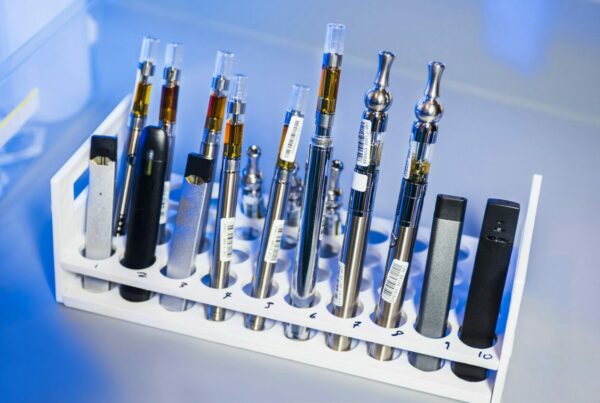N, N-Dimethyltryptamine (DMT) is a chemical compound commonly found in both plants and animals, known for inducing potent, yet short-lived, psychedelic experiences when ingested.
Growing evidence indicates that DMT, naturally present in the human body, plays notable roles in both peripheral and central nervous systems, possibly serving as a neurotransmitter.
While DMT is known to provoke intense psychedelic effects, it generally doesn’t cause many harmful effects, except for potential cardiovascular problems when large doses are injected.
Let’s explore DMT and its diverse roles. These roles range from recreational use to its intriguing potential in scientific research and therapeutic contexts.

A Brief Introduction to DMT: What is it?
| Aspect | Details |
| Name | N, N-Dimethyltryptamine (DMT) |
| Classification | Indole alkaloid |
| Occurrence | Naturally found in a variety of plants and animals |
| Psychoactive Effects | Produces brief, intense psychedelic experiences upon consumption. |
| Method of Consumption | Can be smoked, injected, or consumed orally. |
| Duration of Effects | Effects are typically short-lived, usually lasting between 5 to 30 minutes. |
| Chemical Structure | Features a tryptamine core with two methyl groups attached to the amine nitrogen atom. |
| Metabolism | Rapidly metabolized by the body and broken down by monoamine oxidase (MAO). |
| Cultural Use | Historically used in various ceremonial and shamanic rituals by indigenous cultures. |
| Other names | Dimitrifantasiabusinessman’s tripBusinessman’s special45-minute psychosisspiritual molecule |
The Role of DMT in Mental Health
N, N-Dimethyltryptamine (DMT), a compound known for its powerful psychedelic effects, is garnering attention for its potential benefits to mental health. Despite its conventional association with intense hallucinatory experiences, recent studies suggest a correlation between DMT and mental wellness.
Influence on Psychological and Emotional Well-being
DMT is known for its psychedelic effects, which can induce intense emotional responses and alter states of consciousness. This unique quality of DMT could potentially pave the way for novel therapeutic approaches to mental health issues, facilitate emotional processing, and provide new perspectives on personal traumas.
Neuroplasticity and Brain Function
Research suggests that DMT could influence neuroplasticity, thus enhancing the brain’s ability to adapt and reorganize. Investigating its impact on synaptic plasticity and neural connectivity might present potential remedies for conditions associated with neural maladjustment.
Potential Therapeutic Applications for Mental Health Disorders
Initial studies underscore DMT’s potential in treating ailments such as depression, addiction, and PTSD. Its ability to induce mystical or spiritual experiences could offer a distinctive therapeutic approach to psychotherapy and aid in reforming negative thought patterns.
Investigating the natural presence of DMT within the body underscores its significance in promoting mental health resilience, managing stress response, and maintaining overall psychological well-being. Understanding how the body modulates internal DMT levels could lead to the development of novel therapeutic strategies.
DMT and Mental Health Disorders
| Mental Health Disorder | Description | DMT’s Efficacy | Advantages |
| Depression | A mood disorder characterized by persistent sadness, decreased interest, and reduced motivation | Preliminary research suggests DMT may alleviate symptoms by inducing deeply emotional experiences. | DMT’s rapid onset and ability to provoke transformative experiences may propose innovative therapeutic approaches for reforming negative thought patterns and enhancing emotional processing |
| Post-Traumatic Stress Disorder (PTSD) | A mental health condition triggered by traumatic events, resulting in flashbacks, extreme anxiety, and intrusive thoughts | Initial research indicates DMT’s potential to manage symptoms by inducing spiritual or mystical experiences that could help patients reframe traumatic memories | DMT’s potential to induce altered states of consciousness could help in facilitating emotional processing and providing fresh perspectives on traumatic experiences |
| Addiction | A complex disorder characterized by a compulsive urge to engage in rewarding stimuli despite negative consequences | Some research suggests DMT’s potential role in disrupting addictive behaviors and reducing cravings for substances | DMT’s ability to provoke intense and transformative experiences could help individuals modify their behavioral patterns and confront their issues related to addiction |
Approaches to Utilizing DMT
DMT, renowned for provoking short yet profound psychedelic experiences, can be administered in several ways. The choice of method often depends on the desired intensity and duration of the experience.
Smoking:
When smoked in a pipe or vaporized, DMT needs careful temperature control to prevent the compound from overheating and burning. The psychedelic experience begins almost instantly when DMT is smoked, usually lasting between 5 to 15 minutes.
Oral Intake:
Taking DMT orally leads to slower onset effects that last significantly longer, often for several hours. This is due to the slower breakdown of DMT when mixed with an MAOI.
Injection:
DMT can be injected directly into the bloodstream for immediate and potent effects.
This method results in an instant and intense experience, but it necessitates precise dosage and carries higher risks.
Insufflation (Snorting):
Snorting DMT results in a slower onset of effects compared to smoking but can provide a more prolonged experience.
Sublingual or Buccal Administration:
When absorbed through the oral mucosa, this method offers an alternative to smoking and gives a lengthier, though less intense, experience.
Determining Therapeutic Dosage: N, N-Dimethyltryptamine (DMT)
For smoking, the advised dosage ranges from 20 to 40 mg, while for intravenous application, the suggested dosage is 0.2 to 0.4 mg per kg of body weight. These dosage recommendations are primarily intended for clinical research and are most pertinent for intravenous application.
- Higher doses administered intravenously are associated with vivid visuals, temporary loss of control, and a dual state of anxiety and euphoria
- Notably, lower doses have demonstrated less favorable effects
- Recreational doses of smoked DMT generally range from 40 to 50 mg, occasionally even going up to 100 mg
- Different doses of intravenous DMT (with concentrations of 7, 14, 18, and 20 mg) has been linked with near-death experiences, and users have reported long-lasting, positive enhancements in their psychological wellness.
Availability of DMT
ProductsOsmosis – 4-ACO-DMT Ethereal Essence Tincture
This tincture is promoted to contain 4-Acetoxy-N, N-dimethyltryptamine (4-AcO-DMT), a DMT variant. Tinctures, which are liquid extracts designed for oral ingestion, could offer a unique experience compared to traditional DMT, and this product is no exception.
Lucid Supply Co. – 5-MeO DMT Vaporizer
This product is a vaporizer delivering 5-Methoxy-N, N-dimethyltryptamine (5-MeO-DMT). 5-MeO-DMT, renowned for its potent, transformative, and often brief experiences, is the active ingredient in this vaporizer.
Integral Alchemist – Acacia – 1ml DMT Vape Cartridge
The DMT vape cartridge from Integral Alchemist comes pre-filled with N, N-Dimethyltryptamine. This product is likely aimed at those who favor a discreet and convenient method for consuming DMT.
Deadhead Chemist – 5-Meo-DMT Cartridge
This cartridge houses 5-Methoxy-N, N-dimethyltryptamine (5-MeO-DMT), a compound known for eliciting deep and powerful effects.
DMT may offer potential mental health benefits, which could be related to personal growth, spiritual experiences or therapeutic applications aimed at enhancing emotional health.
Deadhead Chemist – N, N DMT Cartridge
Another offering from Deadhead Chemist, this cartridge contains the classic N, N-Dimethyltryptamine. Cartridges provide a user-friendly way of consuming DMT, ensuring a more consistent and controlled experience.
Concluding Remarks
The consumption of N, N-Dimethyltryptamine (DMT) in
How does one prepare for a DMT experience?
Before embarking on a DMT journey, it’s essential to create a safe, comfortable setting, and to establish a clear intention or goal for the experience.
People should also be prepared for potential emotional upheaval and ensure they have support available, if needed, during the aftermath of the experience.
Mental health therapy provides a thrilling yet complex journey. The substance’s ability to provoke powerful but brief psychedelic episodes opens a new avenue for innovative therapeutic techniques.
Early studies point to its possible role in emotional resolution, personal evolution, and perhaps
Given the profound effect of mental health treatments, they require careful contemplation and prudent use.
If you are keen on responsibly exploring DMT products, credible sources like Sero Canada Online Dispensary are available to guide you and offer a variety of choices.
Frequently Asked Questions:
How do different DMT products affect mental health?
For instance, vaporizers might yield rapid results, whereas tinctures or vape cartridges may provide more controllable and steady doses.
Introducing derivative substances or 5-MeO-DMT can result in varying degrees of potency and distinct mental health effects.
These nuanced differences underscore the importance of selecting a DMT product based on personal preferences and mental health goals.
Can DMT lead to enduring changes in mental health and personal growth?
There are anecdotal accounts proposing that DMT-induced experiences could have lasting effects on mental health and personal development.
Profound or transformative experiences, like those resembling near-death experiences, are often associated with continued positive changes in psychological wellbeing and personal evolution.
While these experiences are intense and ephemeral, they frequently trigger introspection, spiritual revelations, and a sense of unity or enlightenment.
Users often report a revitalized perspective on life, enhanced emotional resilience, and a deepened reverence for life following these experiences.
What is the most effective way to use DMT for mental health?
It is vital to make educated decisions, which involves thorough research and understanding the compound’s effects.
Advice from mental health professionals or seasoned users can provide valuable information about potential risks and benefits.
Understanding one’s personal tolerance and mental readiness is also crucial, as is providing a supportive and safe environment for the experience.
What distinguishes DMT from other psychedelic treatments such as psilocybin or LSD in the context of mental health therapy?
DMT stands out from other psychedelics like psilocybin or LSD in terms of its effects, duration, and intensity. Its fleeting nature necessitates unique therapeutic strategies in mental health that significantly differ from those applied to longer-lasting psychedelics.
Recommended Additional Reading:





